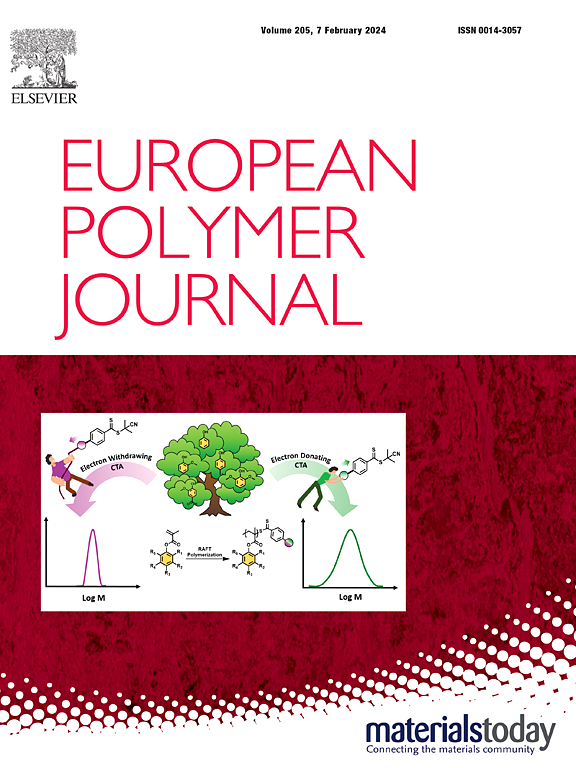Green chemistry in coatings: Terpene based acrylates as substitutes for petrochemical compounds
IF 5.8
2区 化学
Q1 POLYMER SCIENCE
引用次数: 0
Abstract
Terpene-based acrylic monomers provide a sustainable and environmentally friendly alternative to conventional acrylic monomers. Due to their low volatility, they can be directly used in high-solid UV coating systems. The wide variety of monoterpenes allows for tailoring the properties of the acrylates by selecting the appropriate raw material, enabling them to match or even exceed the performance of petrochemical monomers. Novel monoterpene copolymers, synthesized with limonene-based acrylates and nopol-based methacrylate, demonstrated excellent curing performance, thermal stability, and solvent resistance. The storage and loss moduli of the respective homopolymers of the limonene-based monomers were analyzed through DMA measurements. The results indicated that these monomers yield very hard polymers with a moderate degree of cross-linking. These findings underscore the potential of terpene-based acrylates as versatile, high-performance, and sustainable substitutes for fossil-based monomers in UV-coating systems.

涂料中的绿色化学:萜烯基丙烯酸酯作为石化化合物的替代品
萜烯基丙烯酸单体为传统丙烯酸单体提供了一种可持续和环保的替代品。由于它们的低挥发性,它们可以直接用于高固体UV涂层系统。单萜烯种类繁多,可以通过选择合适的原料来定制丙烯酸酯的性能,使其能够匹配甚至超过石化单体的性能。以柠檬烯基丙烯酸酯和nopol基甲基丙烯酸酯为原料合成的新型单萜烯共聚物具有优异的固化性能、热稳定性和耐溶剂性。通过DMA测量分析了柠檬烯基单体各自均聚物的存储模量和损耗模量。结果表明,这些单体产生了非常硬的聚合物,交联程度中等。这些发现强调了萜烯基丙烯酸酯作为紫外涂层系统中化石基单体的多功能、高性能和可持续替代品的潜力。
本文章由计算机程序翻译,如有差异,请以英文原文为准。
求助全文
约1分钟内获得全文
求助全文
来源期刊

European Polymer Journal
化学-高分子科学
CiteScore
9.90
自引率
10.00%
发文量
691
审稿时长
23 days
期刊介绍:
European Polymer Journal is dedicated to publishing work on fundamental and applied polymer chemistry and macromolecular materials. The journal covers all aspects of polymer synthesis, including polymerization mechanisms and chemical functional transformations, with a focus on novel polymers and the relationships between molecular structure and polymer properties. In addition, we welcome submissions on bio-based or renewable polymers, stimuli-responsive systems and polymer bio-hybrids. European Polymer Journal also publishes research on the biomedical application of polymers, including drug delivery and regenerative medicine. The main scope is covered but not limited to the following core research areas:
Polymer synthesis and functionalization
• Novel synthetic routes for polymerization, functional modification, controlled/living polymerization and precision polymers.
Stimuli-responsive polymers
• Including shape memory and self-healing polymers.
Supramolecular polymers and self-assembly
• Molecular recognition and higher order polymer structures.
Renewable and sustainable polymers
• Bio-based, biodegradable and anti-microbial polymers and polymeric bio-nanocomposites.
Polymers at interfaces and surfaces
• Chemistry and engineering of surfaces with biological relevance, including patterning, antifouling polymers and polymers for membrane applications.
Biomedical applications and nanomedicine
• Polymers for regenerative medicine, drug delivery molecular release and gene therapy
The scope of European Polymer Journal no longer includes Polymer Physics.
 求助内容:
求助内容: 应助结果提醒方式:
应助结果提醒方式:


